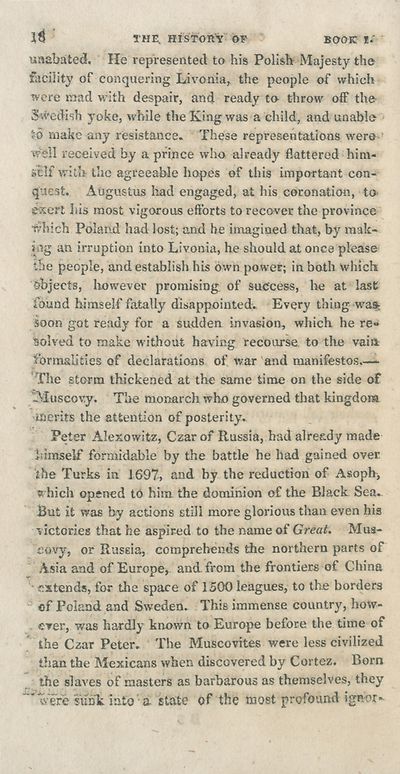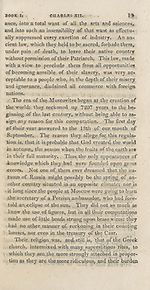Download files
Complete book:
Individual page:
Thumbnail gallery: Grid view | List view

BOOK I.
l4 THE. HISTORY OF
unabated. He represented to his Polish Majesty the
facility of conquering Livonia, the people of which
were mad with despair, and ready to throw off the
Swedish yoke, while the King was a child, and unable
id make any resistance. These representations were
rvell received by a prince who already flattered him¬
self with the agreeable hopes of this important con¬
quest. Augustus had engaged, at his coronation, to
exert Ids most vigorous efforts to recover the province
Tiddch Poland had lost; and he imagined that, by mak¬
ing an irruption into Livonia, he should at once please
the people, and establish his own power; in bath which
objects, however promising of success, he at last
found himself fatally disappointed. Every thing was;
soon got ready for a sudden, invasion, which he re*
■solved to make without having recourse, to the vain
formalities of declarations of war and manifestos.—-
The storm thickened at the same time on the side of
Aluscovy. The monarch who governed that kingdom
merits the attention of posterity.
Peter Alexowitz, Czar of Russia, had already made
himself formidable by the battle he had gained over
the Turks in 1697, and by the reduction of Asoph,
which opened td him the dominion of the Black Sea.
But it was by actions still more glorious than even his
victories that he aspired to the name of Great. Mus¬
covy, or Russia, comprehends the northern parts of
Asia and of Europe, and. from the frontiers of China
extends, for the space of 1500 leagues, to the borders
of Poland and Sweden. This immense country, how-
. ever, was hardly known to Europe before the time of
the Czar Peter. The Muscovites were less civilized
than the Mexicans when discovered by Cortez. Born
the slaves of masters as barbarous as themselves, they
J'" were sunk into a state of the most profound igner-
l4 THE. HISTORY OF
unabated. He represented to his Polish Majesty the
facility of conquering Livonia, the people of which
were mad with despair, and ready to throw off the
Swedish yoke, while the King was a child, and unable
id make any resistance. These representations were
rvell received by a prince who already flattered him¬
self with the agreeable hopes of this important con¬
quest. Augustus had engaged, at his coronation, to
exert Ids most vigorous efforts to recover the province
Tiddch Poland had lost; and he imagined that, by mak¬
ing an irruption into Livonia, he should at once please
the people, and establish his own power; in bath which
objects, however promising of success, he at last
found himself fatally disappointed. Every thing was;
soon got ready for a sudden, invasion, which he re*
■solved to make without having recourse, to the vain
formalities of declarations of war and manifestos.—-
The storm thickened at the same time on the side of
Aluscovy. The monarch who governed that kingdom
merits the attention of posterity.
Peter Alexowitz, Czar of Russia, had already made
himself formidable by the battle he had gained over
the Turks in 1697, and by the reduction of Asoph,
which opened td him the dominion of the Black Sea.
But it was by actions still more glorious than even his
victories that he aspired to the name of Great. Mus¬
covy, or Russia, comprehends the northern parts of
Asia and of Europe, and. from the frontiers of China
extends, for the space of 1500 leagues, to the borders
of Poland and Sweden. This immense country, how-
. ever, was hardly known to Europe before the time of
the Czar Peter. The Muscovites were less civilized
than the Mexicans when discovered by Cortez. Born
the slaves of masters as barbarous as themselves, they
J'" were sunk into a state of the most profound igner-
Set display mode to:
![]() Universal Viewer |
Universal Viewer | ![]() Mirador |
Large image | Transcription
Mirador |
Large image | Transcription
| Antiquarian books of Scotland > Kings & rulers > History of Charles XII, King of Sweden > (38) |
|---|
| Permanent URL | https://digital.nls.uk/115021466 |
|---|
| Description | Thousands of printed books from the Antiquarian Books of Scotland collection which dates from 1641 to the 1980s. The collection consists of 14,800 books which were published in Scotland or have a Scottish connection, e.g. through the author, printer or owner. Subjects covered include sport, education, diseases, adventure, occupations, Jacobites, politics and religion. Among the 29 languages represented are English, Gaelic, Italian, French, Russian and Swedish. |
|---|

